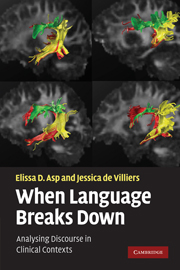Book contents
- Frontmatter
- Contents
- List of figures
- List of tables
- Acknowledgements
- Transcription conventions
- Introduction
- 1 Introduction to clinical discourse analysis
- 2 Theoretical and clinical contexts
- 3 Talk and speech – conversation analysis and intonation in English
- 4 Grammar
- 5 Phase and contexts of culture and situation
- 6 Study design
- 7 Differential diagnosis and monitoring
- 8 Cognitive models, inferencing and affect
- 9 Modelling information across domains
- Closing remarks
- Notes
- Appendix A Some basic grammatical terminology and relations
- Appendix B Inventory of codes
- References
- Author index
- Subject index
Introduction
Published online by Cambridge University Press: 05 June 2012
- Frontmatter
- Contents
- List of figures
- List of tables
- Acknowledgements
- Transcription conventions
- Introduction
- 1 Introduction to clinical discourse analysis
- 2 Theoretical and clinical contexts
- 3 Talk and speech – conversation analysis and intonation in English
- 4 Grammar
- 5 Phase and contexts of culture and situation
- 6 Study design
- 7 Differential diagnosis and monitoring
- 8 Cognitive models, inferencing and affect
- 9 Modelling information across domains
- Closing remarks
- Notes
- Appendix A Some basic grammatical terminology and relations
- Appendix B Inventory of codes
- References
- Author index
- Subject index
Summary
This book is predicated on the relatively uncontentious notions that discourse patterns – what people do when they talk or write – can provide trained observers with information about cognitive functions and affective states in speakers and, further, that cognitive functions and affective states may be signs of integrity of neurological function and structure. Neurolinguists, psycholinguists, aphasiologists, psychiatrists, psychotherapists and speech pathologists all take some variation on assumptions like this as their point of departure in studying brain–behaviour relationships and treating some neurological and affective disorders. However, discourse – people's talk and text – is inherently complex and apparently unstable and, worse, the neurological substrate and processes that support even superficially simple things like ‘how words are represented in the brain’, let alone ‘what happens in brains when people talk’ are matters of active debate and investigation rather than scientific givens. In the face of so much uncertainty and complexity, most of the work done on language–brain relationships has, very sensibly, centred on theoretically discrete and/or methodologically isolatable phenomena associated with particular semantic, morphosyntactic or phonological structures or processes. Work on discourse in clinical environments as another means of investigating neurocognitive (dys-)function, although often called for, has been less common.
This situation is changing now because of technological developments and, we think, a sea-change-like shift that is taking place in attitudes to brain–behaviour relationships.
- Type
- Chapter
- Information
- When Language Breaks DownAnalysing Discourse in Clinical Contexts, pp. 1 - 3Publisher: Cambridge University PressPrint publication year: 2010



